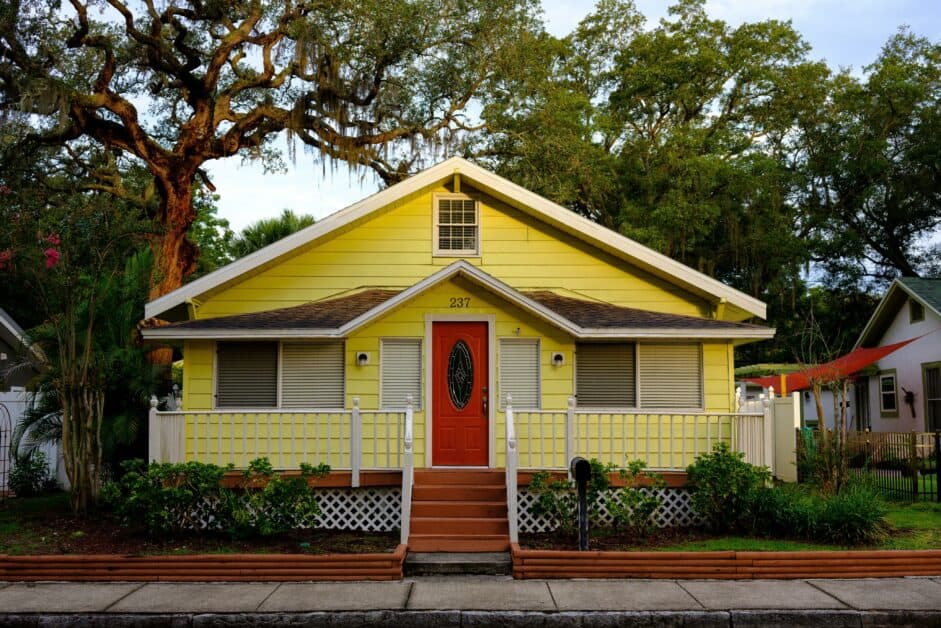Florida has a lot going for it – a low state tax, a thriving economy and a growing population to name but a few. These perks make Florida a particularly appealing place to invest in real estate. There are even more potential benefits to unlock if you’re a homeowner here – namely the homestead exemption. So, to give you a bit more insight into this, we’ll learn whether or not you can claim homestead exemption on rental property in Florida.
Key Takeaways
- A homestead exemption in Florida allows you to enjoy tax relief of up to $50,000.
- It is a tax policy that only applies to your primary residence – so you have to live there.
- You can only apply for homestead exemption for one property at a time.
- Fill out form DR-501 and send it to your local county property appraiser to apply for homestead exemption.
Can I Claim Homestead Exemption on Rental Property in Florida?
The Florida homestead exemption gives you a chance to lower your tax bill on your primary residence. You can save anywhere up to $50,000 by lowering the overall tax value of your property through this exemption. However, it does have a few caveats and deadlines to be aware of, so make sure you’re well-informed if you want to enjoy this benefit.
Homestead Exemptions in Florida: How They Work and Who Qualifies
Florida boasts several favorable tax policies for those who live there, including the homestead exemption. So, let’s take a look at this tax exemption to learn how it works, who qualifies and more.
What Is a Homestead Exemption in Florida?

The Florida Homestead Exemption is a legal provision that aims to offer tax relief to homeowners in the state. It works by assessing the appraised value of your primary residence. It isn’t a tax credit, but a rebate that offers a $25,000 to $50,000 reduction in the assessed value of your residence for tax purposes.
So, can you claim homestead exemption rental property in Florida? Unfortunately, this type of exemption is only suitable for primary residences, so if you own multiple properties – including rentals – it only affects one of them. If you’re a real estate investor in Florida with multiple properties, then you can only apply for a single homestead exemption.
How Does the Standard Exemption Work?
The homestead exemption works by applying it to the first $50,000 of your primary residence’s assessed value. The first half of this figure goes towards all property taxes, including things like school district taxes. The remainder, which is up to $25,000, will apply to the value between $50,000 and $75,000 and doesn’t factor in school district taxes.
For example, if you have a home that is assessed at $75,000, then the first $25,000 as well as the amount between $50,000 and $75,000 is exempt. This would leave only $25,000 as taxable.
Who Qualifies for It?
There are a few criteria that you’ll need to meet in order to qualify for the homestead exemption in Florida. This includes:
- Primary Residence: The property that you apply the exemption to must be your primary residence. It can’t be used for rental properties, second homes, or vacation properties.
- Ownership: You must have full legal ownership and title of the property.
- Deadlines: You’ll need to file your application for homestead exemption by March 1st of the year that you intend to receive the exemption.
If you’d like to delve deeper into the intricacies of the homestead exemption, the Florida Department of Revenue offers excellent resources to help inform you.
How Do I Apply for It?

Applying for homestead exemption in Florida is a relatively straightforward process, but it does require a little bit of preparation. If you’re wondering, ‘how can I claim homestead exemption on rental property in Florida?’ then read on. Below, we’ll go over the steps you should take to apply for homestead exemption in Florida:
Check Eligibility
First, you’ll want to make sure you’re eligible for the homestead exemption. This includes things mentioned above like ensuring that you apply for your primary residence and that you’re classified as a permanent resident of Florida.
Gather Documents
In order to apply for the homestead exemption, you’ll require up-to-date documentation. So try to gather the following documents:
- Proof of property ownership such as a deed.
- Florida identification or a driver’s license issued in Florida.
- Supplementary proof of ownership such as a vehicle registered to your residence.
- Social Security Number.
- Additional documentation if you’re a non-U.S. citizen, such as proof of permanent residency.
Submitting Your Application
The application you need to fill out for homestead exemption in Florida is known as Form DR-501 and is available from the Florida Department of Revenue’s website. It will ask about key information relating to your property, so complete is truthfully and as completely as possible.
Once you’ve filled out the form, you can send it to your county’s property appraiser who will review your case. Remember – the application will need to be submitted by March 1st of the year that you intend to receive the exemption.
No more guesswork. Accurate estimates only.
Talk to an investor agent
What Is a Homestead?

In a general sense, a homestead refers to the primary residence of an individual or family. It incorporates the surrounding land owned by the homeowner as well as any other buildings attached to it.
In a legal and tax-related context, a homestead tends to refer to the primary residence of an individual. It’s in this context that the homestead exemption refers to, which is important because it unlocks various benefits such as the homestead exemption.
Do You Have to Live in a House You Own to Claim the Homestead Exemption in Florida?
If you want to utilize the homestead exemption in Florida, you can only claim it on your primary residence. That means it’s the property where you reside for the majority of the time. Simply owning the property isn’t enough – if you want to benefit from the homestead exemption, you have to live there.
If you’re using the property for rental purposes and want to enjoy the homestead exemption, you can’t rent out the entire property. You can rent out individual rooms, but you still have to use the property as your primary residence. As a result, renting out the entire property would make you ineligible for this exemption.
Can I File Florida Homestead Exemption Application Online?
If you’re eligible for the Florida homestead exemption, you’ll want to fill out the DR-501 form and send it to your county’s property appraiser. You can find information for your local appraiser here. Most appraisers will allow for online applications, and in many cases, it’s the preferred option as it’s faster. There are a few other benefits associated with online filing, such as:
- Faster application updates in real-time.
- Your application can have certain sections pre-filled to make the process easier.
- You remove the manual processing stage, which speeds up the process.
- You won’t have to print out and send a form, which is faster and more efficient.
Alongside your application, make sure you provide appropriate identification such as a copy of your driver’s license. In terms of timescales and pricing, the form takes a few minutes to complete and costs nothing.
I Just Moved Into My New Home. When Should I Apply for Homestead Exemption?
If you’ve just moved into your new home in Florida, then you’ll want to apply for homestead exemption sooner rather than later. In order to qualify for this exemption, you must live in the home as your primary residence from January 1st of that year. The deadline to apply is March 1st, so make sure you’ve submitted your application before then.
Supporting Documents for Homestead Exemption
If you’ve moved into your new home after January 1st, then you’ll have to wait until next year to file for homestead exemption. You can use this extra time to prepare your documents and get everything ready for next year’s application. The primary documentation you’ll require is some form of state-issued identification, such as a valid driver’s license from Florida. It’s equally important that your identification has the correct address, so make sure it’s all up-to-date.
Heir Property
Heir property is any property owned by more than one person who claims it as their primary residence. In some cases, heir properties are the result of intestacy or the contents of a will. If you aren’t identified as a primary residence owner of an heir property, you’ll need to provide the following supplemental information:
- A copy of a utility bill.
- A copy of the death certificate of the previous owner.
Homestead Exemption for Partial Ownership – Unmarried Co-owners
If you have partial ownership of a property with an unmarried co-owner, then you may still be eligible for homestead exemption. It will largely depend on the amount of interest you hold on the property. So if you have a 50 % share, then you can only receive half of the exemption – or $20,000.
Homestead Exemption for Married Couples
If you’re attempting to file for homestead exemption as a married couple, then the state will view your situation as that of community property owners. As long as you are joint owners of the property and both live there, you will receive 100 % of the homestead exemption.
What Is the Last Day to File for Homestead Exemption in Florida?
In Florida, the deadline for filing for homestead exemption is March 1st of the year that you want to apply for the exemption. You must adhere to this deadline, as missing out means you won’t enjoy the exemption until the following year.
Generally speaking, it’s a good idea to apply as soon as you can, as this will give you the best chance to receive the homestead exemption. Also, make sure all of your paperwork is completed correctly and any supplementary evidence of documents is accurate.
What If You Forgot to File Homestead Exemption Form in Time?
Although you should always try to file for homestead exemption on time, sometimes you miss the deadline. In most cases, this means you will miss out on the exemption until the following year, but there are exceptions. These include:
- Late Filing: In some counties in Florida, you can still apply for homestead exemption if you apply after March 1st but before the property tax roll closes in September. This is often at the discretion of the country appraiser, so it isn’t a guarantee.
- Good Cause Provision: If some extenuating circumstances caused you to miss the homestead exemption deadline, then you may be able to file under the good cause provision. Reasons include serious illness or family emergencies and successful filing will be at the appraiser’s discretion.
With great insights come great investments. And even greater profit.















